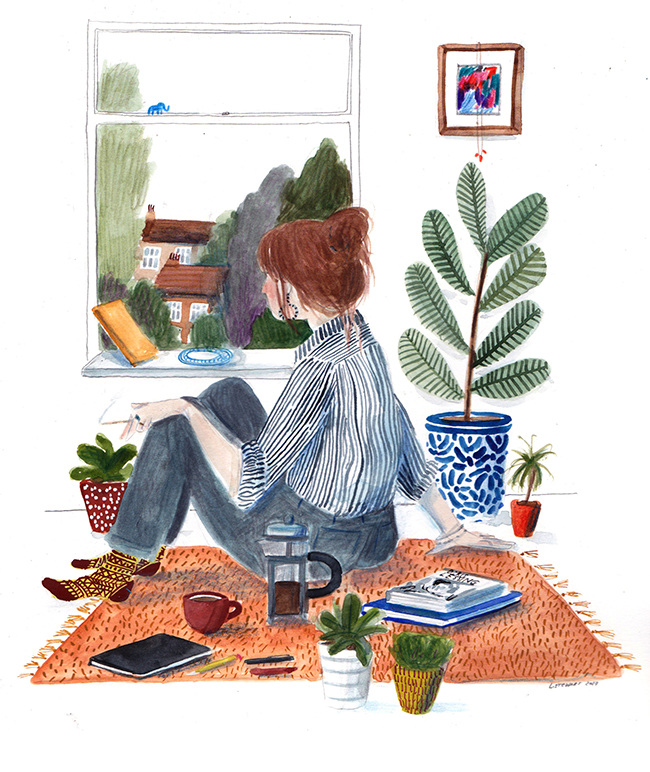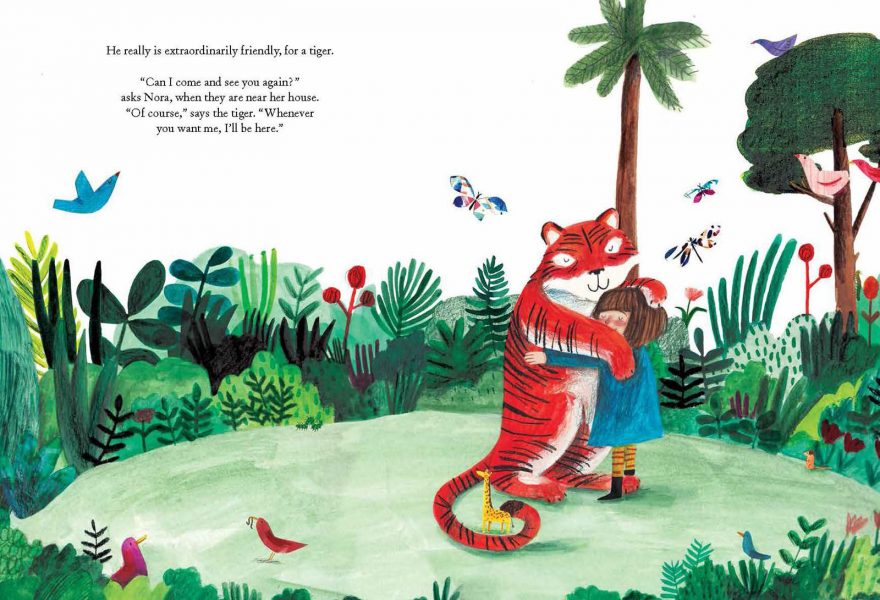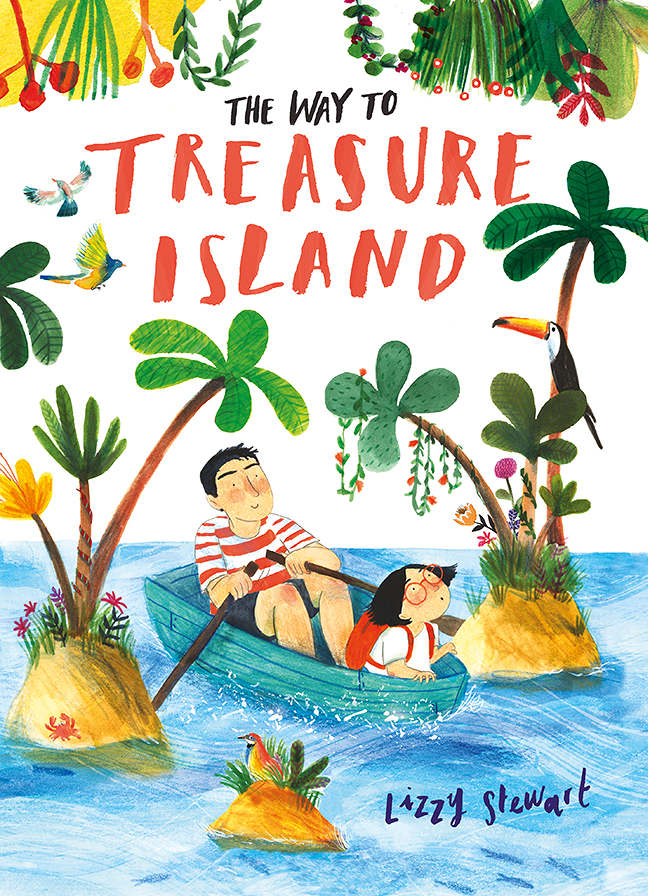
Can you tell us a bit about yourself?
I’m and illustrator and, now, an author. I live in South London where I also have a shared studio. I studied at Edinburgh College of Art and then at Central St Martins and I’ve now been a freelancer for almost ten years. Which is truly terrifying!
I’ve worked in all fields of illustration in that time and never really planned on settling in one area but, quite by accident, I find that I am currently completely focused on making picture books. I’ve written and illustrated three of my own and I worked on a few more besides that. At the moment I’m branching out into different forms of illustrated book, some for children and some for adults.
How do you approach negotiating with clients?
I have an agent! Which is very much the easy way out in many respects! But there are a different set of things to negotiate there too. When I’m doing work without my agent my key focus is ensuring that I am communicating as clearly as possible with my client, especially if they’re new to commissioning illustration.
Specify a usage (one day, one month, a year, print, print and web etc etc) first as it’s often the thing that new clients are most unclear on.
“Many feel that commissioning an image means that it’s theirs to do what they want with and its vital to make it clear, in a very polite way, that that is not the case!”
When a job is hard to price for I will often just ask, outright, what the budget is. Usually the client has an idea in mind and it seems mad to make you jump through invisible hoops trying to guess what that might be. I have no qualms with just asking! If it’s rubbish you can say no, if it’s almost enough you can politely negotiate up by explaining and justifying the extra cost. And on the very rare occasion that it’s more than you would have quoted then you keep quiet and take the money!

We’ve had a hugely successful year helping out members successfully negotiate their contracts, particularly in publishing. How do you approach negotiating your publishing contracts?
I am very lucky that I have an agent who deals with all my publishing contracts. Otherwise I think I’d really struggle. Even when my agent sends through detailed descriptions (he’s so helpful) there are still parts that I have to read and re-read. He often re-writes clauses on my contracts so that they are less ambiguous and there can be no confusion on the outcomes. Which is great.
“I know the AOI are amazing, reading and “interpreting” contracts if you don’t have an agent as well”.
How did you learn about contracts and what all the clauses mean? Are there clauses that are problematic to illustrators that you are seeing more of?
When I was at Edinburgh College of Art we had two lectures on contract law. At the time they were deeply boring and hard to follow but I feel lucky, now, that I had them at all. Many universities don’t offer that kind of information to their undergrads despite it being really, really vital – again I know the AOI offer member Uni’s a business masterclass that is really great, so if your college isn’t a member ask them to sign up!
Otherwise I’ve done a lot of googling when it comes to reading through contracts. Larger corporations often have very, very complex contract agreements and it can take hours and hours to figure out which bits apply to you!
The thing I am most conscious of, in publishing at least, is that there is often very little offered to the Illustrator in way of royalties. We are always careful to negotiate a royalty payment. If a publisher makes money off your work then so should you! As an author/illustrator this is a bit easier as there is no doubt that the work only exists because of you!
However, when you’re working solely as an illustrator it can be a bit of a battle! Perhaps publishers feel that the book could exist without you and that there are plenty of others they could get to do it for less!
“But it is important that you argue for your slice of the pie! When it comes to children’s books especially, the main selling point, in the first instance, are the images”.

Illustration plays an enormous role in profit-making and royalty payments should reflect that. I’ve also noticed recently that there is a growth in (pretty poor) one-off payments for book work.
The boom in children’s books recently, especially non-fiction, seems to have commodified certain areas of the market. Publishers produce books as ‘products’ rather than as creative works. They expect illustrations quickly and for a one-off fee with no money for royalties.
This is, obviously, not the case with most publishers, but I have been approached for jobs that treat the illustrations like painting and decorating, a one-off task that needs completely, albeit by someone skilled. This kind of work is easy to turn down if you’ve been at it a while (like me. Oh God. I’m so old…) but for younger illustrators I can imagine that the need to get paid might eclipse any financial foresight!
You are great at seeing your work as a business – what are some of the most important ways you achieve this?
“Mostly I am quite resentful that my work life might bleed into my life-life so I draw a lot of lines in order to keep myself sane: No working at the weekend unless on your own projects or for something so preposterously well paid you don’t care about the weekend!”
Try not to post every single thing you do on instagram, you have to retain some things for yourself. Equally talking about a project too far in advance of its publication is exhausting for your followers.
I try to keep admin time minimal, so I stay on top, mostly, of my emails as I go along.
My main bugbear at the moment is that the clients I correspond with via email are paid for every hour of their working day. I, however, am only paid task-by-task. My pictures earn me money but dealing with emails and filling out questionnaires etc doesn’t.
We rarely acknowledge how much time clients ask us to spend on stuff that isn’t drawing- ‘Can you do this interview for our online magazine?’ ‘Can you answer some questions so that we can promote the work you did for us’.
This is actually unpaid time that you have to spend at your computer when you could be, literally, anywhere else! So, I try to avoid that as much as possible – or charge for my time.
Equally filling in forms can take an age. I don’t know why so many companies and universities use glitchy word docs for the payment forms, it takes ages to get them filled out right as the text boxes keep moving etc. I tend to save that sort of thing for a morning at home when I’m feeling calm.

Freelance income can be precarious. how do you manage your finances? How did you learn this?
I learnt this by very, very slowly earning more each year over the ten years of my career. It wasn’t like I was broke and then earning a good wage six months later. I have been hilariously, depressingly poor (£7.50 in all the world, poor) and worked up from that.
Having a slow, steady increase has allowed me to understand how much I need, basically, to survive and how much I need to make that survival just a bit nicer.
I am incredibly lucky that I have always know that if I really messed it up my parents would take me in or provide a bit of financial support and knowing that that cushion is there makes it easier to make decisions. Whilst I am not from a wealthy family I feel so incredibly lucky to know that I am from a loving one and that my parents have always trusted me to make this career work. Knowing that you’re not entirely on your own makes your financial life a lot less stressful, even if you never have to call on those people, you know they’re there.
Nowadays I use an accounting app for my finances. I check my online banking daily and keep a record of what I spend and where. I used to be terrified of looking at my bank balance and would put it off for weeks but actually the best advice I could possibly give is to check it every day!
What percentage of your income comes from Royalties and product sales?
These days a fairly hefty chunk! Which makes life a lot easier. I know I have some fall-back cash at intervals during the year. It’s very helpful. I guess, last year, it probably made…35% or thereabouts. Which isn’t too terrible at all!
Not very much income comes from product sales at the moment! But it used to be my main income when I had just started. I did it all myself and had very few stockists but I had some nice people online who supported my work and it kept me going.
My biggest tip is getting all your postal supplies on eBay!
How do you look after your wellbeing? headspace, workspace, building up your confidence etc?
By doing as many things that aren’t related to illustration as possible! Equally by trying to talk about illustration as little as possible when I’m not in the studio. I have always felt it important to take my job seriously and not-seriously-at-all in equal measure. It’s so important to see the value in what we do, it’s worth and its weight but we also need to recognise that…it’s not THAT serious and it’s probably best to look away from it all as often as possible.
Top 3 tips for your peers
– Regularly look at your bank account, daily is good but every other day is ok.
– Take your time off seriously. Your work is reliant on you being a functional human being and that only happens when you do nice-life-things away from your desk.
“Be aware, always, that your time is worth something”.
– That might be financial worth or personal worth but either way you should always be thinking about what your time means to you. If you’re happy to work weekends and evenings then you should, at least, ensure your clients are paying you sufficiently.